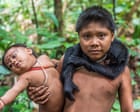
In a world that continuously strives for progress and inclusivity, recent developments in Brazil and New Zealand shine a light on the complexities and considerations needed to uphold the rights and integrity of diverse communities.
Deep within the heart of the Amazon rainforest, an intriguing but concerning scenario is unfolding. It has come to light that missionary groups are utilizing advanced technology in their efforts to evangelize isolated Indigenous peoples in the protected territories of Brazil. According to a comprehensive investigation conducted by The Guardian and Brazilian newspaper O Globo, these groups have been deploying solar-powered audio devices that broadcast biblical passages in Portuguese and Spanish to the Korubo people of the Javari Valley, near the Brazil-Peru border. Further perplexity has been added with sightings of drones within these areas by Brazilian state agents tasked with preserving these lands.
These developments highlight a tension between cultural preservation and external influence. The Brazilian government has implemented stringent measures to protect isolated Indigenous groups, recognizing the importance of maintaining their autonomy and shielding them from external disruptions. The appearance of these gadgets suggests a direct challenge to these protective efforts, prompting a careful dialogue about the impact of such clandestine activities on culturally rich yet vulnerable communities. The subtle yet profound message communicated by these incursions reflects the global discourse on Indigenous peoples’ rights to self-determination and uninterrupted existence.
Moving across the globe to New Zealand, a similarly thought-provoking conversation is underway concerning electoral reforms and their potential impact on human rights. The nation’s Prime Minister, Christopher Luxon, has advocated for significant changes to New Zealand’s electoral laws, branding them as obsolete and inefficient. Among the proposed reforms are measures such as shutting down voter enrollment 13 days before election day, reinstating a complete ban on prisoner voting, and forbidding the provision of free food, drink, or entertainment within a close radius of voting stations.
However, these proposals have stirred concern from Judith Collins, New Zealand’s attorney general, who warns that such changes could infringe upon human rights laws and disproportionately disenfranchise the Māori population and other communities. Despite these cautionary notes, Prime Minister Luxon remains staunch in his resolve to advance the reforms—pointing to a need for modernization and efficiency within the electoral system.
This discourse underscores the ongoing balance between democratic integrity, human rights, and inclusivity. As the government seeks to revitalize electoral processes, the voices of marginalized groups call for attentive deliberation to avoid unintentional exclusion. The dialogue in New Zealand is a microcosm of broader global conversations striving to harmonize progress with the safeguarding of individual and community rights.
Both Brazil and New Zealand are at pivotal junctures, as they grapple with the rich tapestry of cultural identity on one side and the pressing need for systematic evolution on the other. While the approaches and contexts differ markedly, the underlying theme remains consistent—a mindful consideration of how best to honor and integrate diversity in the face of inevitable change.
As these stories unfold, they serve as reminders of the gentle but firm necessity to navigate progress while leaving no voice unheard. In doing so, they guide us to reflect on our shared responsibility to cultivate an inclusive world where technology, tradition, and reform harmoniously coexist.
Source: {link}
